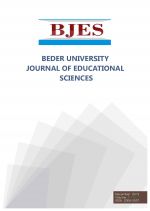
Classification of English for Specific Purposes and Overview of the Language Skills in ESP Context
Abstract
English is the official language in more than 50 countries around the globe, and is the most common second language worldwide. It is believed that English appears as the most learned and taught language in over 100 countries in the world and that almost half of the population in the world use English, either natively or as a second or foreign language. Since the knowledge of General English is not satisfactory to help professionals function well at work or at vocational educational settings, therefore the necessity for English for Specific Purposes or English as a Professional Language arose. English for Specific Purposes or ESP is a branch of applied linguistics that deals with teaching and learning English as a Second or Foreign Language, with particular emphasis on students' academic, professional, social and cultural needs. This paper presents the earliest classification of ESP and an overview of the basic language skills such as writing, speaking, listening and reading in ESP context. In regard to the productive and receptive language competences speaking, writing, reading and listening in terms of ESP, speaking as a skill in ESP context indicates that being �orally skillful� is not considered to be crucial, due to the fact that it is believed that writing is to be prioritized because written genres were considered essential to professional success in the past. Moreover, authentic texts are important for reading in ESP so the emphasis is on professional information that is in the text, and not within language structures. The vocabulary is an inevitable segment when it comes to reading, as reading is considered as an independent skill (acquiring professional vocabulary independently) and integrated skill. Listening in ESP and Listening in terms of General English are not equivalent, therefore ESP listening aims to develop active listeners who construct interpretations on the basis of input and ask for the needed information.
Keywords
rural, community, development
Authors
Jason Hedrick, Greg Homan, Jason Horstman, Mark Light, Jeff Dick5
Download Article

This work is licensed under a Creative Commons Attribution 4.0 International License.
Warning: mysql_free_result() expects parameter 1 to be resource, null given in /var/www/journals/bjes.beder.edu.al/article.php on line 45